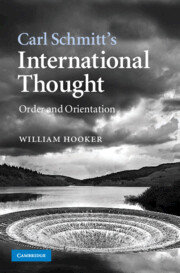Book contents
- Frontmatter
- Contents
- Preface
- Chronology of Schmitt's life
- 1 Introduction
- 2 Schmitt's ‘international thought’
- 3 Unravelling sovereignty
- 4 Histories of space
- 5 Acceleration and restraint
- 6 Großraum
- 7 Partisan
- 8 Conclusion
- Appendix. Carl Schmitt in international relations: a bibliographic essay
- Bibliography
- Index
Appendix. Carl Schmitt in international relations: a bibliographic essay
Published online by Cambridge University Press: 29 March 2010
- Frontmatter
- Contents
- Preface
- Chronology of Schmitt's life
- 1 Introduction
- 2 Schmitt's ‘international thought’
- 3 Unravelling sovereignty
- 4 Histories of space
- 5 Acceleration and restraint
- 6 Großraum
- 7 Partisan
- 8 Conclusion
- Appendix. Carl Schmitt in international relations: a bibliographic essay
- Bibliography
- Index
Summary
Fully twenty-six papers were presented to the Standing Group on International Relations panel on ‘The International Political Thought of Carl Schmitt’ at the 2004 conference in the Hague. It gave the impression of a dam bursting in international relations (IR), and of a widespread, pent-up interest in the possible applications of Schmitt in IR theory flooding out. Participants were drawn from fields as diverse as international law, political theory, theology, literary theory, intellectual history and IR itself. Inevitably such a diverse gathering generated much debate at cross-purposes. But this reception was quite exceptional for the vast range of theoretical applications to which Schmitt's work was put.
With apologies for the necessity of creating simplistic typologies, it is suggested that the emergence of Schmitt into international political theory can be traced broadly within traditions of thought associated variously with the Left and Right of the political spectrum. Such a distinction is inevitably open to challenge, and rightly so. What it emphasises, however, is that most of the interest shown in Schmitt over the past twenty or so years has come from thinkers who self-consciously inhabit the outer fringes of political discourse, and whose work is not especially concerned with its own poltical respectability. What these approaches share is their adoption of Schmitt as a theorist of the necessity of a political pluriverse, to be cited against the apparent advance of global liberal hegemony.
- Type
- Chapter
- Information
- Carl Schmitt's International ThoughtOrder and Orientation, pp. 203 - 217Publisher: Cambridge University PressPrint publication year: 2009



